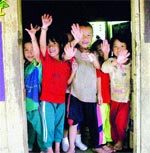child orphans of the war on drugs face malnutrition and lies
 There's always money for airports or other hare-brained schemes, never enough money to feed even one orphan of parents murdered by government death squads. Thailand's twisted and corrupt value system-- sign of a decadent and contemptable society, rotten to the core.
There's always money for airports or other hare-brained schemes, never enough money to feed even one orphan of parents murdered by government death squads. Thailand's twisted and corrupt value system-- sign of a decadent and contemptable society, rotten to the core.from The Nation:
Child victims of the war on drugs:
Ban Mae Maeh School director Saneh Jai-ut can never bring himself to speak the truth when his students ask him expectantly: "Have you had any word from my parents?"
Most of the 136 boarding-school students here come from families torn apart during the Thaksin Shinawatra government's war on drugs.
Some of the children are yet to learn the painful fact that their parents are either in jail for drug offences or were killed in the crackdown.
"The best thing I can say is, 'Yes, your parents ask
you to be good and study hard. They say they will come to pick you up when they have time'," Saneh said.
Located in the remote hill country of Chiang Dao district, the school is inaccessible by road and cellular telephone signal.
The government's Basic Education Commission provides needy schools with a daily food allowance of Bt6 per student. This meagre amount is not enough for Ban Mae Maeh School. It must serve three meals a day - not just lunches like others. "Boiled rice and boiled cabbage are our main dishes," a Grade-6 student at the school said.
Most students do not return to their homes during school breaks because they have no one to return to, he explained.
A young girl said she missed her home but had no idea how she could return by herself.
"Usually, I ask my headmaster to call my parents. But I have rarely seen any parent come to visit their children," she added.
When she first arrived, there were just 60 students but that soon doubled.
"I have shared a bedroom with 31 other girls. We take turns cooking and cleaning," she said.
Aree Boonkerd, a 26-year-old school worker, said border-patrol officers, village heads and government officials brought the children to the school during the government war on drugs.
The Thaksin administration launched the crackdown in early 2003. It left as many as 2,500 people dead. Many were the victims of extrajudicial killings.
Human-rights activists allege many innocent people were killed. They now demand Thaksin be held responsible.
Ban Mae Maeh headmaster Wong Kaewjaima said the number of children sent to the school did rise during the anti-drug efforts.
"The school has become overcrowded. The school and its students need assistance," he said.
Saneh hoped his students would be better fed and they could enjoy their education. "We teach students from kindergarten level up to Grade 6. Our concern is with our graduates. We don't know what will happen to those who cannot continue their education at secondary schools."
Saneh said the school tried hard to rehabilitate students so that they could live happily in society.
"We hope our students will be good members of society," he said.
